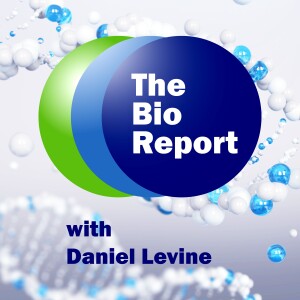Episodes

5 days ago
5 days ago
Finding New Targets on the Surface of Misfolded
One of the biggest hurdles in drug development is targeting proteins found in both healthy and diseased cells without triggering toxic side effects. In cancer, this challenge often translates into narrow therapeutic windows, collateral damage to normal tissues, and forced dose reductions that limit efficacy. The result is a crowded field where many companies chase the same well-known targets, leaving vast patient populations without effective options. Immuto Scientific is taking a different approach. The company is redefining how targets are identified—focusing not on genetic sequence, but on disease-specific protein conformations. By studying the structural shapes that proteins take in malignant cells, Immuto aims to distinguish cancerous from healthy tissue, broaden therapeutic windows, and unlock new or previously undruggable targets across oncology and beyond. We spoke with Faraz Choudhury, co-founder and CEO of Immuto Scientific, about the company’s AI-enabled structural surfaceomics platform, how it allows drugs to selectively home in on diseased cells while sparing normal ones, and Immuto’s plans to extend its science into immunology and inflammation.
Proteins

Wednesday Jan 14, 2026
Targeting Tumors from the Inside Out
Wednesday Jan 14, 2026
Wednesday Jan 14, 2026
Systemic chemotherapy remains the foundation of cancer treatment, but its widespread toxicity too often cuts short potential therapeutic benefits. NanOlogy is developing a new approach—localized cancer therapy that keeps the drug where it’s needed most. We spoke to Marc Iacobucci, managing director of Nanology about the company’s precision particle engineering platform, how it transforms existing oncology drugs into microparticles optimized for intratumoral delivery; and how this enables sustained, high-concentration dosing inside tumors that destroys cancer cells, stimulates immune responses, and spares patients the debilitating effects of systemic chemotherapy.

Wednesday Jan 07, 2026
An Effort to Detect and Treat Alzheimer’s at Its Earliest Stages
Wednesday Jan 07, 2026
Wednesday Jan 07, 2026
One of the challenges in treating the neurodegenerative condition Alzheimer’s disease is intervening early enough in the course of illness to provide meaningful benefit. AltPep is developing therapeutics with companion diagnostics that target toxic α-sheet–containing oligomers, which are thought to form very early in the disease and act as molecular triggers of downstream amyloid pathology. These structures are believed to represent some of the earliest detectable stages of Alzheimer’s and to promote the formation of amyloid plaques, a hallmark feature of the condition. We spoke with Valerie Daggett, founder and CEO of AltPep, about the relationship between α-sheet oligomers and the onset of Alzheimer’s disease, how the company’s synthetic peptides are designed to bind and neutralize these pathogenic agents, and the potential for this platform to be extended to a broader set of amyloid diseases.

Wednesday Dec 31, 2025
The Year in Biotech and What’s Ahead for 2026
Wednesday Dec 31, 2025
Wednesday Dec 31, 2025
Biotech stocks staged a dramatic turnaround in 2025, with the XBI well outpacing the S&P 500 despite concerns over leadership changes at the U.S. Food and Drug Administration, the Trump administration’s efforts to put constraints on drug pricing, and its broader cuts to health and science agencies. A pick-up in deal-making, along with falling interest rates, helped buoy the sector with growing anticipation for continued improvement in 2026. We sat down with Adam Feuerstein, senior biotech writer for STAT, for our annual review-preview edition, the noteworthy trends in the biotech sector 2025, and what’s in store at the upcoming JPMorgan Healthcare Conference and beyond in 2026.

Wednesday Dec 24, 2025
Developing an Alternative to Opioids for Post-Surgical Pain
Wednesday Dec 24, 2025
Wednesday Dec 24, 2025
The approach to post-surgical pain relief has relied on short-duration treatments and notably opioids. That’s led to the associated risks of dependence and abuse, prolonged hospitalizations, and slower recoveries. Allay Therapeutics is developing an alternative to opioids to treat post-surgical pain with an initial focus on knee replacement surgeries. Allay’s guitar pick-sized polymer is implanted during surgical procedures and it releases the analgesic bupivacaine as it dissolves over 30 days. We spoke to Adam Gridley, CEO of Allay Therapeutics, about post-surgical pain, the need for alternatives to opioids; and the company’s implanted, extended-release analgesic.

Wednesday Dec 17, 2025
Leveraging the Power of Vocal Biomarkers
Wednesday Dec 17, 2025
Wednesday Dec 17, 2025
Physicians can learn a lot from talking to patients, and not just from the words they say, but from millions of data points from acoustic features of their speech, such as pitch, vocal cord vibration patterns, and micro-instabilities in the voice. Canary Speech has developed an AI-based diagnostic listening tool that can detect neurological and psychiatric conditions from physiological signals in the voice. We spoke to Kang Hsu, chief medical officer of Canary Speech, about how its diagnostic tool works, how it is embedded invisibly into clinical workflows, and how the company is driving physician adoption.

Wednesday Dec 10, 2025
Determining the Cause and Severity of Sepsis with a Point-of-Care Test
Wednesday Dec 10, 2025
Wednesday Dec 10, 2025
Sepsis remains one of medicine’s most intractable and costly problems, arising when an infection triggers a runaway immune response that damages organs long after a pathogen is controlled. It accounts for an estimated $53 billion in Medicare spending alone, yet more than a hundred drug trials have failed to yield a single approved drug that directly treats the underlying immune dysfunction. Inflammatix, which grew out of work at Stanford University, has developed a point-of-care blood test to determine whether an infection is bacterial or viral, as well as the severity of the patient’s immune response to optimize treatment. We spoke to Tim Sweeney, CEO of Inflammatix, about the company’s TriVerity test for sepsis, how it works, and how it is used in an ER setting to determine who needs antibiotics, ICU‑level care, or a broader diagnostic workup.

Wednesday Dec 03, 2025
Separating Signal from Noise in Regenerative Therapies
Wednesday Dec 03, 2025
Wednesday Dec 03, 2025
Rion is developing platelet-derived exosome therapeutics as off-the-shelf, room-temperature-stable alternatives to traditional cell therapies. The company’s lead program is advancing toward phase 3 trials in diabetic foot ulcers, and it is building a broader pipeline across musculoskeletal, cardiovascular, pulmonary, dermatologic, and women’s health indications. The company is built on stem cell research conducted at the Mayo Clinic that showed that regenerative benefits from treatments stemmed from exosome-mediated biological signaling that promoted healing rather than from transplanted stem cells themselves. We spoke to Atta Behfar, co-founder and CEO of RION, about how the company’s purified exosome products work, their potential as scalable, cost-effective regenerative therapies, and how they avoid the immune issues that have long hampered cell-based approaches.

Daniel Levine
Daniel Levine is an award-winning business journalist who has reported on the life sciences, economic development, and business policy issues throughout his career. He is founder and principal of Levine Media Group, host of The Bio Report and RARECast podcasts, a senior fellow at the Center for Medicine in the Public Interest, and author of Global Genes’ annual NEXT report on emerging trends in the world of rare disease. From 2011 to 2014, he served as the lead editor and writer of Burrill & Company’s acclaimed annual book on the biotech industry. His work has appeared in numerous national publications including The New York Times, The Industry Standard, and TheStreet.com.

